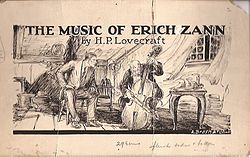Plot
Due to lack of funds, a student studying metaphysics abroad is forced to take up lodging in a cheap apartment building on a street named the "Rue d'Auseil". The street is not far from his university and is bordered by a river, dark warehouses and a large wall, and is described as being very steeply inclined, as if being on a cliff. The student cannot see what lies on the other side of the wall, as only a single window on the top floor of his building looks over it. Along with the building's disabled landlord, Blandot, one of the few other tenants is an old German man named Erich Zann. The old man is mute and plays the viol [a] with a local theater orchestra. He lives alone on the top floor and at night he plays strange melodies the student has never heard before.
Despite Zann's reclusiveness, Blandot reveals his identity to the student, who approaches him in the hallway one evening and asks if he can listen to Zann's music. Zann allows the student to enter his room. He plays for the student some of his unique melodies but not the same as the student had previously heard. The student asks him if he could play his music from the previous nights, awkwardly humming and whistling the notes he remembered. Zann is taken aback by the request and nervously glances at the window in his room, covered by curtains. The student recognizes the window as the only one that can oversee the wall at the end of the mysterious street. He approaches it to look outside but Zann angrily pulls him back. The student is fed up with Zann's eccentricities but Zann explains through writing that he is simply a lonely old man, and suffers from numerous phobias and nervous disorders. He is pleased that the student likes his music, but refuses to play the particular tunes that the student asked for. He persuades the student to move to a lower floor in the apartment as he would prefer the student not listen to them. The student sympathizes with Zann and agrees to move. Zann promises that he will invite the student to his room to hear his other music. After the student moves, however, Zann returns to his antisocial behavior and his health deteriorates, eventually not letting the student listen at all.
The student's curiosity to hear the secret music and look out the window grows, and he begins eavesdropping on Zann while he plays at night. His melodies have an unearthly sound, and the student praises Zann as a musical genius. One night while secretly listening outside Zann’s room, the student hears a commotion and the old man scream inside. When the student bangs at the door, Zann lets him in and asks him to wait while he writes, promising to explain everything. More than an hour into writing, Zann is startled by a distant sound in the form of a low note, interrupts his writing and starts furiously playing his viol with a crescent terror. The music is horrific and the student surmises that Zann is playing wildly to drown out or keep something out of the room. Zann seemingly enters a stupor, doing nothing but playing his music. Another sound from outside the room, which the student perceives to be mocking them, is heard and a gust shatters the window. The unnatural wind sweeps through the room, blowing Zann's unread papers out the window, despite the student's attempts at catching them. The student remembers his curiosity and finally looks out the window. Instead of seeing the city lights, he only sees a terrible black void, an infinite abyss of chaos.
The howling winds and cacophony of elements snuff out the candles in the room, leaving the student and Zann in complete darkness. He blindly moves through the dark with desperation, and feels a "chill thing" brush up against him. Determined to save Zann, the student reaches the musician and screams at him to run, but Zann only continues to play his music. Upon attempting to physically carry him to safety, he discovers Zann is dead, although his body is still playing. With this realization, the student bolts for the door, frantically fleeing the apartment and entire neighborhood. He only realizes afterward that the sky was calm and the city lights were shining.
Writing an account of the incident years later, the student states that despite his best efforts, he has never again been able to find the Rue d'Auseil. It does not appear on any maps, and it seems no one else has even heard of it. But he feels a degree of relief that he cannot find the street, or the lost papers that could have explained the music of Erich Zann.

